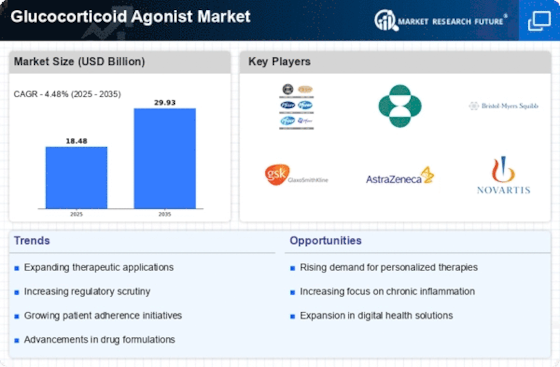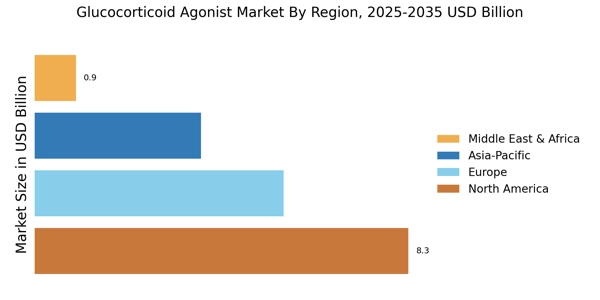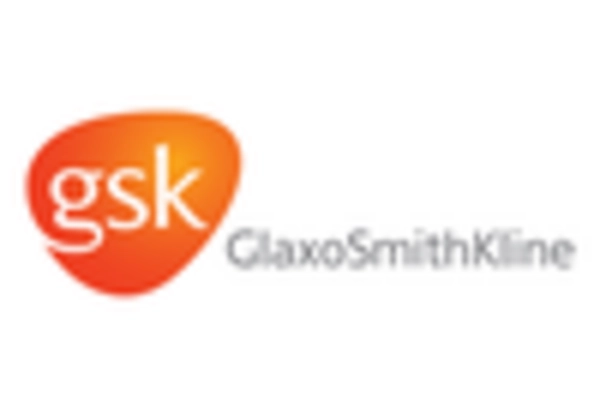Increasing Geriatric Population
The demographic shift towards an aging population is a crucial factor influencing the Glucocorticoid Agonist Market. Older adults are more susceptible to chronic inflammatory conditions and autoimmune diseases, which often necessitate the use of glucocorticoid agonists for effective management. As the global population ages, the demand for medications that address these health issues is expected to rise. Reports indicate that by 2030, the number of individuals aged 65 and older will significantly increase, further amplifying the need for glucocorticoid therapies. This demographic trend suggests a sustained market demand, as healthcare systems adapt to cater to the unique needs of older patients. Consequently, the glucocorticoid agonist market is likely to experience growth driven by this demographic shift.
Advancements in Pharmaceutical Research
Innovations in pharmaceutical research and development are likely to propel the Glucocorticoid Agonist Market forward. The ongoing exploration of glucocorticoid agonists has led to the discovery of new formulations and delivery methods that enhance efficacy and reduce side effects. For instance, recent studies have focused on developing targeted therapies that minimize systemic exposure while maximizing therapeutic benefits. This shift towards precision medicine is expected to attract investment and foster collaborations among pharmaceutical companies, thereby expanding the market. Furthermore, the introduction of novel glucocorticoid agonists with improved pharmacokinetic profiles could significantly alter treatment paradigms, making them more appealing to healthcare providers and patients alike. As a result, the market is poised for growth driven by these advancements.
Regulatory Support for New Drug Approvals
Regulatory agencies are increasingly supportive of the development and approval of new glucocorticoid agonists, which is anticipated to benefit the Glucocorticoid Agonist Market. Streamlined approval processes and incentives for innovative therapies encourage pharmaceutical companies to invest in research and development. This regulatory environment fosters the introduction of novel glucocorticoid agonists that can address unmet medical needs. Additionally, the emphasis on patient safety and efficacy in drug development aligns with the growing demand for effective treatments. As more glucocorticoid agonists receive regulatory approval, the market is likely to expand, providing healthcare providers with a broader range of therapeutic options. This trend indicates a positive outlook for the glucocorticoid agonist market.
Growing Prevalence of Autoimmune Disorders
The rising incidence of autoimmune disorders, such as rheumatoid arthritis and lupus, appears to be a primary driver for the Glucocorticoid Agonist Market. As these conditions become more prevalent, the demand for effective treatment options increases. Glucocorticoid agonists are often prescribed to manage inflammation and suppress the immune response, making them essential in therapeutic regimens. According to recent estimates, autoimmune diseases affect millions of individuals, leading to a substantial market opportunity for glucocorticoid agonists. The increasing awareness and diagnosis of these disorders further contribute to the market's growth, as healthcare providers seek to offer patients effective management strategies. This trend indicates a sustained demand for glucocorticoid agonists, positioning them as a cornerstone in the treatment landscape.
Rising Awareness of Chronic Inflammatory Conditions
The increasing awareness of chronic inflammatory conditions among both healthcare professionals and patients is a significant driver for the Glucocorticoid Agonist Market. Educational initiatives and advocacy efforts have led to better recognition of diseases such as asthma, arthritis, and inflammatory bowel disease. As awareness grows, patients are more likely to seek medical advice and treatment options, including glucocorticoid agonists. This heightened awareness is reflected in the rising prescription rates for these medications, as healthcare providers are more inclined to recommend them for managing inflammation and associated symptoms. Consequently, the market is expected to benefit from this trend, as more individuals seek effective therapies for chronic inflammatory conditions.

















